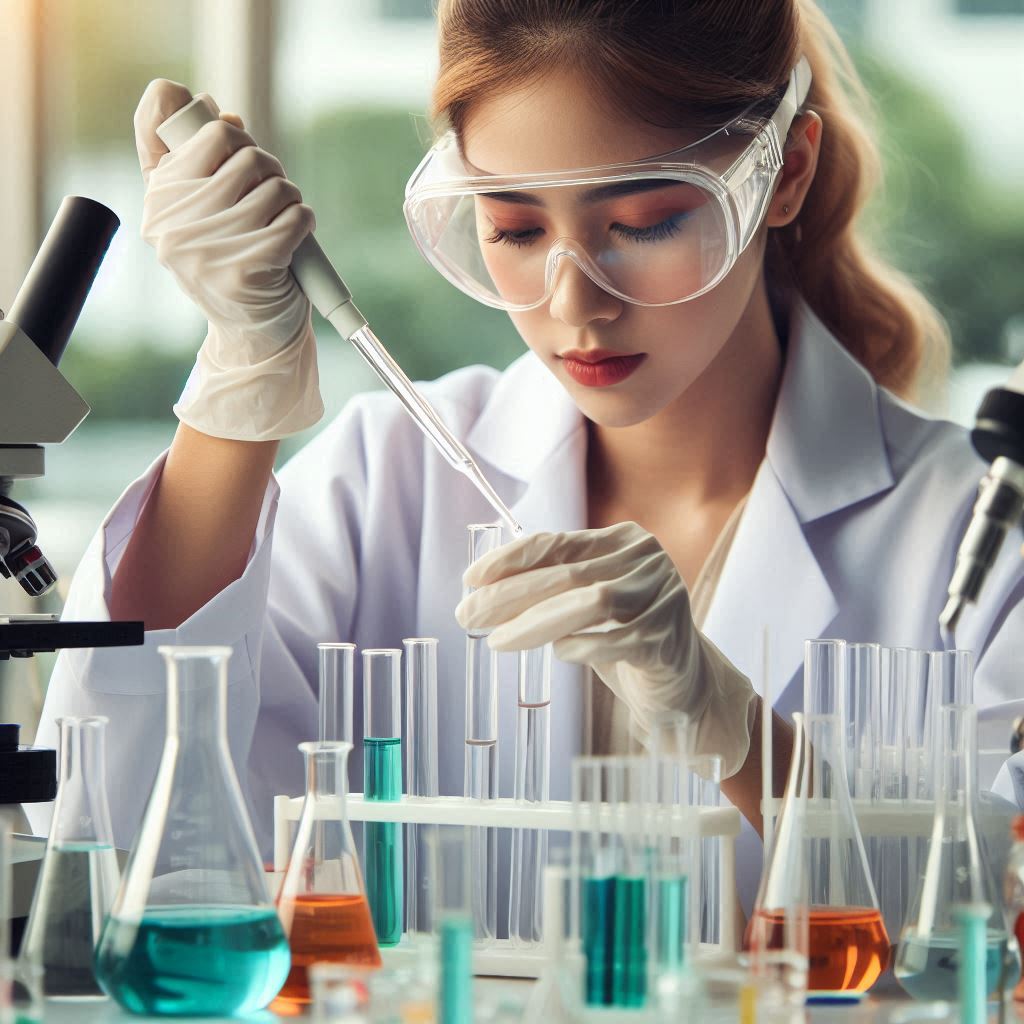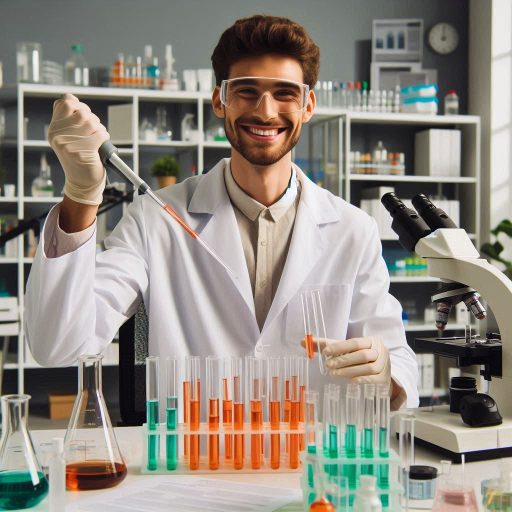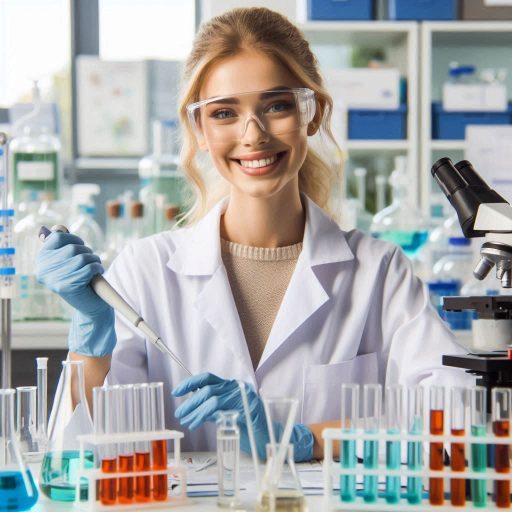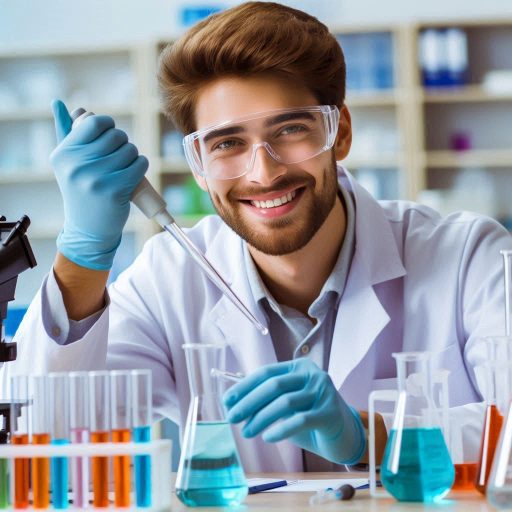Introduction
Overview of What a Laboratory Technician Does
A laboratory technician plays a key role in analyzing samples and conducting tests to support research and diagnostics.
They handle complex equipment, prepare samples, and ensure the accuracy and reliability of results.
Their work involves tasks such as operating diagnostic machines, recording data, and following strict protocols.
Importance of Laboratory Technicians in Various Industries
Laboratory technicians are essential across multiple sectors.
In healthcare, they help diagnose diseases and track patient health.
In pharmaceuticals, they are involved in drug development and quality assurance.
Environmental scientists rely on technicians to monitor and manage pollutants, ensuring safety and compliance with regulations.
Their work supports critical scientific and medical advancements, making them indispensable in their fields.
Different Career Pathways Available for Laboratory Technicians
Laboratory technicians can explore various career paths.
They may specialize in clinical technology, research and development, or forensic analysis.
Additionally, opportunities exist in management, education, or regulatory roles.
Each pathway offers unique challenges and potential for career advancement, reflecting the diverse applications of laboratory skills.
Education and Training Requirements for Laboratory Technicians
High School Diploma or Equivalent
To start a career as a laboratory technician, you need a high school diploma or an equivalent qualification.
This is the basic educational requirement for entering the field.
High school courses in biology, chemistry, and mathematics can be particularly helpful.
They provide a foundational understanding essential for laboratory work.
Associate’s Degree or Certification Program in Laboratory Science
Next, pursuing an associate‘s degree in laboratory science is highly recommended.
This degree typically takes two years to complete and covers essential topics like microbiology, chemistry, and lab techniques.
Many community colleges and technical schools offer these programs.
They provide both theoretical knowledge and practical skills necessary for laboratory work.
Alternatively, you might consider enrolling in a certification program.
These programs often focus on specific skills and techniques needed in laboratory settings.
Certification programs can vary in length and content but generally include both coursework and hands-on training.
On-the-Job Training and Continuing Education Required
On-the-job training is crucial for laboratory technicians.
Even with a degree or certification, practical experience is essential.
This training allows technicians to familiarize themselves with laboratory equipment and procedures.
It also helps them adapt to the specific requirements of their workplace.
Continuing education is important throughout a laboratory technician‘s career.
The field of laboratory science is always evolving, with new technologies and techniques emerging regularly.
Staying updated with the latest developments ensures that technicians maintain their skills and knowledge.
Continuing education can be achieved through workshops, seminars, and specialized courses.
Many employers require laboratory technicians to participate in ongoing training.
This may include learning about new lab equipment, techniques, or regulatory changes.
By engaging in continuous learning, technicians ensure they remain competent and effective in their roles.
In summary, becoming a laboratory technician involves several key steps.
Start with a high school diploma or equivalent, followed by an associate‘s degree or certification in laboratory science.
On-the-job training provides practical experience, and ongoing education helps maintain and advance your skills.
This combination of education, practical experience, and continuous learning prepares you for a successful career in laboratory technology.
Read: Top Surveying and Mapping Technician Employers
Skills and Qualities Needed
Attention to Detail and Accuracy
Attention to detail and accuracy are crucial for laboratory technicians.
Inaccurate measurements or errors in procedures can lead to faulty results and compromised data.
Technicians must meticulously follow protocols and double-check their work to ensure precision.
Every step in laboratory processes requires careful observation and exactitude to maintain the integrity of experiments and tests.
Strong Analytical and Problem-Solving Skills
Strong analytical and problem-solving skills are essential for laboratory technicians.
They often face complex problems that require critical thinking to resolve.
Analyzing test results, identifying patterns, and troubleshooting issues demand a keen analytical mind.
Technicians need to interpret data accurately and develop solutions when unexpected results or technical issues arise.
Ability to Work Independently and as Part of a Team
Laboratory technicians must be able to work independently and as part of a team.
Many tasks require solitary focus, where technicians perform tests and analyze data alone.
However, collaboration with colleagues is also vital, especially when working on joint projects or troubleshooting problems.
Effective communication and teamwork contribute to a successful laboratory environment and efficient problem resolution.
Proficiency in Using Laboratory Equipment and Software
Proficiency in using laboratory equipment and software is a fundamental skill for technicians.
Familiarity with instruments like spectrophotometers, centrifuges, and microscopes is essential for conducting experiments.
Additionally, knowledge of laboratory software for data entry and analysis helps in managing and interpreting test results.
Technicians must stay updated with advancements in technology and ensure they use equipment and software effectively.
In summary, to excel as a laboratory technician, attention to detail, strong analytical and problem-solving skills.
The ability to work independently and as part of a team, and proficiency in using laboratory equipment and software are essential.
These skills and qualities enable technicians to perform their duties accurately, handle complex problems, collaborate effectively, and utilize technology efficiently.
Read: Safety Tips for Field Surveying Technicians
Entry-Level Positions
Laboratory Assistant or Technician in a Hospital, Research Facility, or Industrial Lab
Entry-level positions for laboratory technicians often include roles such as laboratory assistant or technician.
These positions can be found in various settings, including hospitals, research facilities, and industrial labs.
Each environment offers unique opportunities and challenges.
Hospitals focus on clinical diagnostics, research facilities emphasize scientific studies, and industrial labs may involve quality control and product development.
Responsibilities Include Preparing Samples, Conducting Tests, and Maintaining Lab Equipment
In these entry-level roles, technicians are responsible for preparing samples, conducting tests, and maintaining lab equipment.
Preparing samples involves handling and processing materials to ensure they are ready for analysis.
Conducting tests requires following protocols and using laboratory instruments to generate data.
Maintaining lab equipment includes routine calibration, cleaning, and troubleshooting to ensure equipment operates correctly and efficiently.
Opportunities for Advancement and Specialization
Entry-level positions provide a foundation for career growth and specialization.
Technicians can advance to more senior roles, such as lead technician or laboratory manager, with experience and additional training.
Specialization areas might include clinical laboratory science, forensic science, or environmental testing.
Pursuing advanced degrees or certifications can further enhance career prospects and open doors to specialized fields within laboratory science.
In summary, entry-level positions such as laboratory assistant or technician in hospitals, research facilities, or industrial labs offer a solid starting point.
Responsibilities include preparing samples, conducting tests, and maintaining lab equipment.
These roles provide opportunities for advancement and specialization, enabling technicians to grow their careers and explore various areas within the field.
Read: Recent Trends in Surveying and Mapping Technologies

Advanced Career Pathways
Specialization in a Specific Field
As laboratory technicians advance in their careers, specializing in a specific field can be a key pathway.
Areas of specialization might include microbiology, chemistry, or genetics.
Specializing allows technicians to develop in-depth expertise and focus on specific types of analyses or experiments.
For instance, microbiologists study microorganisms, chemists work on chemical processes, and geneticists explore genetic variations and heredity.
Advanced training and certifications in these areas enhance career prospects and open doors to specialized roles.
Supervisory or Managerial Roles in a Laboratory Department
With experience, laboratory technicians can move into supervisory or managerial roles.
These positions involve overseeing laboratory operations, managing staff, and ensuring compliance with safety and quality standards.
Managers handle administrative tasks, such as budgeting and scheduling, and may also be responsible for strategic planning and improving lab processes.
Leadership roles require strong organizational and communication skills, as well as the ability to mentor and guide junior technicians.
Research Positions in Academic Institutions or Pharmaceutical Companies
Advanced career pathways also include research positions in academic institutions or pharmaceutical companies.
Technicians with a strong research background may work as research scientists or principal investigators.
These roles involve designing and conducting experiments, analyzing data, and publishing research findings.
Working in academic institutions often includes teaching responsibilities, while positions in pharmaceutical companies focus on drug development and testing.
Advanced degrees and research experience are typically required for these roles.
In summary, advanced career pathways for laboratory technicians include specialization in fields like microbiology, chemistry, or genetics.
Supervisory or managerial roles in laboratory departments offer leadership opportunities.
Research positions in academic institutions or pharmaceutical companies provide avenues for conducting cutting-edge studies and contributing to scientific advancements.
Each pathway requires additional training, experience, and a commitment to professional development.
Transform Your Career Today
Unlock a personalized career strategy that drives real results. Get tailored advice and a roadmap designed just for you.
Start NowRead: Networking Tips for Surveying and Mapping Professionals
Continuing Education and Certification for Laboratory Technicians
Pursuing a Bachelor’s or Master’s Degree
Continuing education plays a crucial role in advancing a laboratory technician‘s career.
Pursuing a bachelor‘s or master‘s degree in a related field can open doors to higher-level positions and specialized roles.
A bachelor‘s degree may focus on broader topics within laboratory science, while a master‘s degree allows for deeper exploration of specific areas, such as molecular biology or clinical research.
These advanced degrees enhance your knowledge and skills, making you a more competitive candidate for senior roles.
Obtaining Certification from Professional Organizations
Obtaining certification from professional organizations, such as the American Society for Clinical Pathology (ASCP) or the National Healthcareer Association (NHA), is another important step in career development.
Certification demonstrates your expertise and commitment to the field, often leading to better job opportunities and higher salaries.
Many employers prefer or require certified technicians, as it ensures that they meet industry standards.
Certifications are available in various specialties, allowing you to align your credentials with your career goals.
Keeping Up with Advancements in Technology and Techniques
The field of laboratory science is constantly evolving, with new technologies and techniques emerging regularly.
Staying current with these advancements is essential for maintaining your skills and knowledge.
Participating in workshops, conferences, and online courses can help you stay informed about the latest developments in the field.
Continuous learning not only improves your job performance but also positions you as a valuable asset to your organization.
It ensures that you can adapt to changes in technology and remain proficient in your role.
In summary, continuing education and certification are key components of a successful laboratory technician career.
Pursuing advanced degrees, obtaining certification from reputable organizations, and staying updated with advancements in technology and techniques are essential steps.
These efforts lead to career advancement, increased job opportunities, and enhanced expertise in the field.
Salary and Job Outlook for Laboratory Technicians
Median Salary for Laboratory Technicians
The median salary for laboratory technicians is a key factor in understanding the financial prospects of the career.
According to recent data, the median annual wage for laboratory technicians is around $54,000.
This figure can vary based on the specific industry and region.
Laboratory technicians working in hospitals or research facilities might earn different salaries compared to those in industrial or environmental labs.
Projected Job Growth in the Field
The job outlook for laboratory technicians is positive, with projected growth expected to be steady over the next decade.
The demand for laboratory technicians is driven by the ongoing need for medical and scientific research, diagnostics, and quality control.
As technology continues to advance and new testing methods are developed, the role of laboratory technicians becomes increasingly vital.
The Bureau of Labor Statistics estimates a growth rate of about 7% in the field, which aligns with the average growth rate for all occupations.
Factors Affecting Salary, Such as Location and Experience
Several factors can influence a laboratory technician‘s salary, including location, experience, and specialization.
Technicians working in metropolitan areas or regions with a high cost of living typically earn higher salaries.
Experience also plays a significant role in determining earnings.
Entry-level technicians may start at a lower wage, but salaries tend to increase with experience and additional certifications.
Specializing in areas like genetics or microbiology can also lead to higher pay due to the demand for expertise in these fields.
In summary, the median salary for laboratory technicians is approximately $54,000, with steady job growth projected.
Factors such as location, experience, and specialization significantly impact earning potential.
The field offers promising opportunities for those seeking a stable and rewarding career in laboratory science.
Work Environment and Challenges for Laboratory Technicians
Typical Work Settings for Laboratory Technicians
Laboratory technicians typically work in a variety of settings, including hospitals, research facilities, industrial labs, and educational institutions.
In hospitals, technicians focus on clinical diagnostics, analyzing patient samples to assist in medical diagnoses.
Research facilities emphasize scientific discovery, where technicians support experiments in fields like genetics, microbiology, or pharmacology.
Industrial labs may involve quality control and product testing, often in manufacturing or environmental sectors.
Educational institutions employ technicians to assist with teaching and research activities in academic labs.
Potential Hazards and Safety Precautions in a Laboratory
Working in a laboratory environment comes with potential hazards, making safety precautions crucial.
Laboratory technicians are often exposed to chemicals, biological agents, and potentially dangerous equipment.
Proper use of personal protective equipment (PPE), such as gloves, goggles, and lab coats, is essential to minimize risks.
Technicians must follow strict protocols for handling hazardous materials, disposing of waste, and operating equipment safely.
Regular safety training and adherence to guidelines help prevent accidents and ensure a safe working environment.
Emotional and Physical Demands of the Job
The role of a laboratory technician can be both emotionally and physically demanding.
The job requires long periods of standing, precise manual dexterity, and the ability to focus on detailed tasks for extended periods.
Emotional demands arise from the need to produce accurate results under tight deadlines, which can be stressful.
Additionally, technicians may deal with sensitive or distressing samples, particularly in clinical settings.
Managing these demands requires resilience, attention to self-care, and the ability to work effectively under pressure.
In summary, laboratory technicians work in diverse settings, each with its own focus and challenges.
The job comes with potential hazards, necessitating strict safety precautions and regular training.
The role also involves significant emotional and physical demands, requiring technicians to maintain focus, dexterity, and resilience.
Understanding and managing these challenges is essential for success and longevity in the laboratory technician profession.
Find Out More: Specializations Within Geotechnical Engineering
Conclusion
Key Points Discussed in the Blog Post
Throughout this blog, we’ve highlighted the diverse roles and responsibilities of laboratory technicians.
These professionals work in settings such as hospitals and research labs, performing tasks like operating advanced equipment and analyzing samples.
Key skills include technical proficiency, attention to detail, and a passion for science.
The role of a laboratory technician is crucial in ensuring accurate test results and supporting scientific research and medical diagnostics.
Encouragement to Consider a Career as a Laboratory Technician
If you have a keen interest in science and enjoy hands-on work, consider pursuing a career as a laboratory technician.
This field not only offers job stability and growth but also provides numerous opportunities for professional advancement.
With the increasing reliance on laboratory services in healthcare and research, the demand for skilled technicians is strong.
Resources for Further Exploration of Career Pathways in Laboratory Science
For more information on advancing your career in laboratory science, check out resources like the American Society for Clinical Pathology and the National Society for Histotechnology.
These organizations offer valuable insights into education, certification, and career development.
Explore their websites to take the next steps in your career journey.




